Old Chinese Idioms:历史典故的英文翻译
- 格式:doc
- 大小:27.00 KB
- 文档页数:5

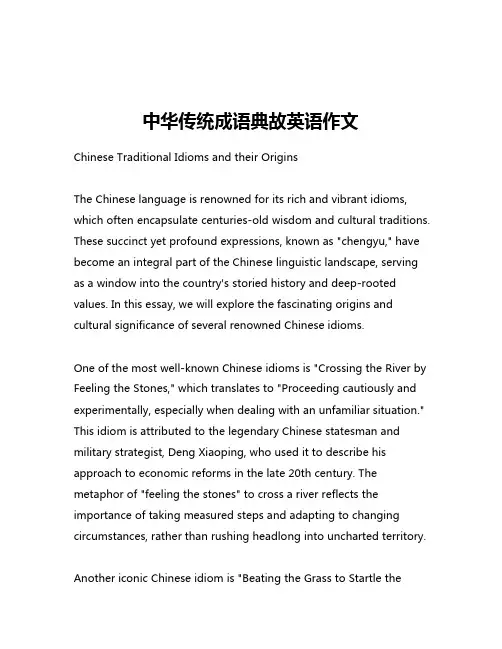
中华传统成语典故英语作文Chinese Traditional Idioms and their OriginsThe Chinese language is renowned for its rich and vibrant idioms, which often encapsulate centuries-old wisdom and cultural traditions. These succinct yet profound expressions, known as "chengyu," have become an integral part of the Chinese linguistic landscape, serving as a window into the country's storied history and deep-rooted values. In this essay, we will explore the fascinating origins and cultural significance of several renowned Chinese idioms.One of the most well-known Chinese idioms is "Crossing the River by Feeling the Stones," which translates to "Proceeding cautiously and experimentally, especially when dealing with an unfamiliar situation." This idiom is attributed to the legendary Chinese statesman and military strategist, Deng Xiaoping, who used it to describe his approach to economic reforms in the late 20th century. The metaphor of "feeling the stones" to cross a river reflects the importance of taking measured steps and adapting to changing circumstances, rather than rushing headlong into uncharted territory.Another iconic Chinese idiom is "Beating the Grass to Startle theSnake," which means "to do something in a roundabout way to achieve a goal." This phrase is believed to have originated from a military tactic used during the Spring and Autumn period (770-476 BC), where soldiers would create a disturbance in the grass to flush out hidden enemies. The idiom highlights the value of indirect action and strategic thinking, emphasizing the importance of subtlety and flexibility in problem-solving.The idiom "Painting the Dragon and Adding Eyes," which means "to add the finishing touches to something," is a testament to the Chinese reverence for the dragon, a mythical creature deeply ingrained in the country's cultural heritage. The phrase is derived from the belief that a dragon painting is only complete once the eyes are added, as this final detail is believed to imbue the creature with life and power. This idiom underscores the importance of attention to detail and the transformative power of the finishing touches in any endeavor.One of the most poetic Chinese idioms is "Watching the Clouds from the Shade of a Tree," which translates to "to enjoy a leisurely, carefree existence." This phrase evokes the image of a person taking respite under the shade of a tree, observing the natural world with a sense of tranquility and detachment. The idiom reflects the Chinese appreciation for the simple pleasures of life and the pursuit of inner peace, a sentiment that is deeply rooted in the country'sphilosophical traditions, such as Taoism and Buddhism.The idiom "Waiting for the Hare while Sitting on the Trap," which means "to be prepared and patient for an opportunity," is a testament to the Chinese emphasis on strategic foresight and delayed gratification. This phrase is believed to have originated from a hunting technique where a hunter would set a trap and then patiently wait for the right moment to strike. The idiom underscores the importance of planning, patience, and vigilance in achievingone's goals, a valuable lesson that transcends the realm of hunting and can be applied to various aspects of life.These are just a few examples of the rich tapestry of Chinese idioms and their captivating origins. Each idiom serves as a portal into the country's cultural heritage, revealing the wisdom, values, and traditions that have shaped the Chinese people over the centuries. By understanding the depth and nuance of these linguistic gems, we can gain a deeper appreciation for the enduring legacy of Chinese civilization and the timeless insights it has to offer the world.。
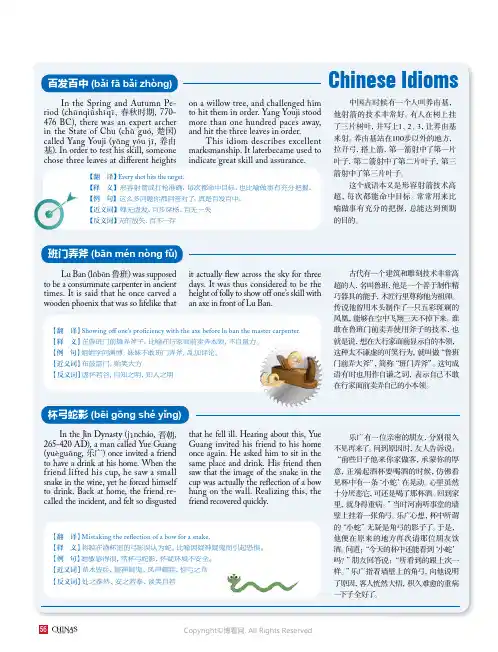
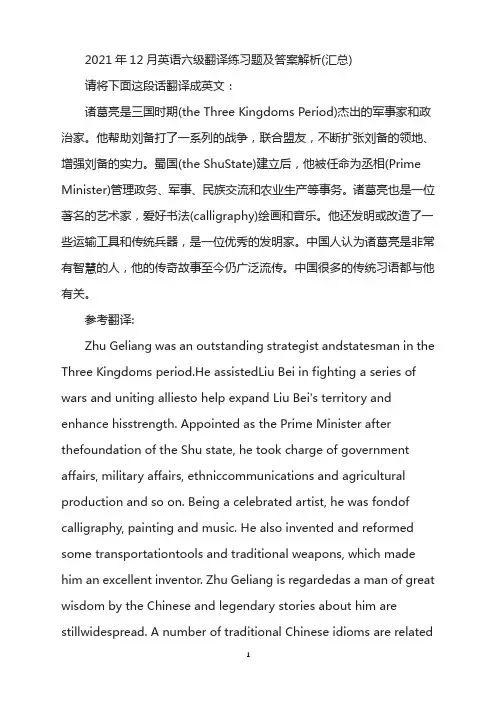
2021年12月英语六级翻译练习题及答案解析(汇总)请将下面这段话翻译成英文:诸葛亮是三国时期(the Three Kingdoms Period)杰出的军事家和政治家。
他帮助刘备打了一系列的战争,联合盟友,不断扩张刘备的领地、增强刘备的实力。
蜀国(the ShuState)建立后,他被任命为丞相(Prime Minister)管理政务、军事、民族交流和农业生产等事务。
诸葛亮也是一位著名的艺术家,爱好书法(calligraphy)绘画和音乐。
他还发明或改造了一些运输工具和传统兵器,是一位优秀的发明家。
中国人认为诸葛亮是非常有智慧的人,他的传奇故事至今仍广泛流传。
中国很多的传统习语都与他有关。
参考翻译:Zhu Geliang was an outstanding strategist andstatesman in the Three Kingdoms period.He assistedLiu Bei in fighting a series of wars and uniting alliesto help expand Liu Bei's territory and enhance hisstrength. Appointed as the Prime Minister after thefoundation of the Shu state, he took charge of government affairs, military affairs, ethniccommunications and agricultural production and so on. Being a celebrated artist, he was fondof calligraphy, painting and music. He also invented and reformed some transportationtools and traditional weapons, which made him an excellent inventor. Zhu Geliang is regardedas a man of great wisdom by the Chinese and legendary stories about him are stillwidespread. A number of traditional Chinese idioms are relatedto him.1.第二句中,可将“他帮助刘备打了一系列的战争,联合盟友”作为主句;后面的“不断扩张刘备的领地、增强刘备实力”可视为前句所述行为的目的,因此采用不定式来表达tohelp expand...enhance...。
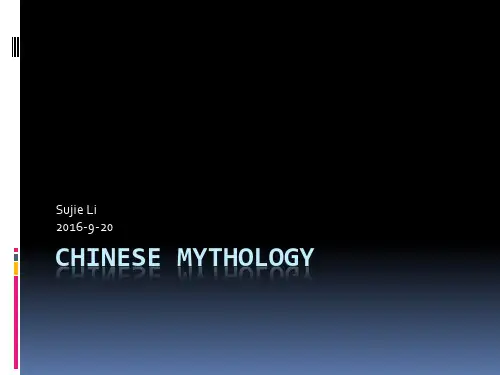
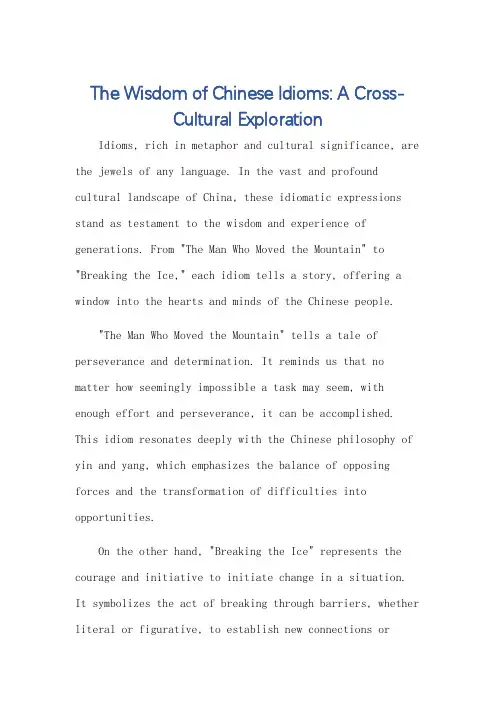
The Wisdom of Chinese Idioms: A Cross-Cultural ExplorationIdioms, rich in metaphor and cultural significance, are the jewels of any language. In the vast and profound cultural landscape of China, these idiomatic expressions stand as testament to the wisdom and experience of generations. From "The Man Who Moved the Mountain" to "Breaking the Ice," each idiom tells a story, offering a window into the hearts and minds of the Chinese people."The Man Who Moved the Mountain" tells a tale of perseverance and determination. It reminds us that no matter how seemingly impossible a task may seem, with enough effort and perseverance, it can be accomplished. This idiom resonates deeply with the Chinese philosophy of yin and yang, which emphasizes the balance of opposing forces and the transformation of difficulties into opportunities.On the other hand, "Breaking the Ice" represents the courage and initiative to initiate change in a situation.It symbolizes the act of breaking through barriers, whether literal or figurative, to establish new connections orbring about positive transformation. This idiom embodies the Chinese value of adaptability and resilience, urging us to embrace challenges and seize opportunities for growth. These idioms are not just figurative expressions; they are cultural touchstones that connect us to the past and inform our understanding of the present. They reflect the values, beliefs, and wisdom of the Chinese people, making them relevant and valuable across cultures and languages. In conclusion, the study of Chinese idioms offers a unique perspective on the rich and diverse cultural heritage of China. They are not just words; they are stories, lessons, and insights into the human experience. As we delve into the world of Chinese idioms, we embark on a journey of discovery, learning, and understanding that transcends linguistic barriers and connects us to the universal themes of human life.**中华成语的智慧:跨文化探索**成语,充满隐喻和文化内涵,是任何语言的瑰宝。
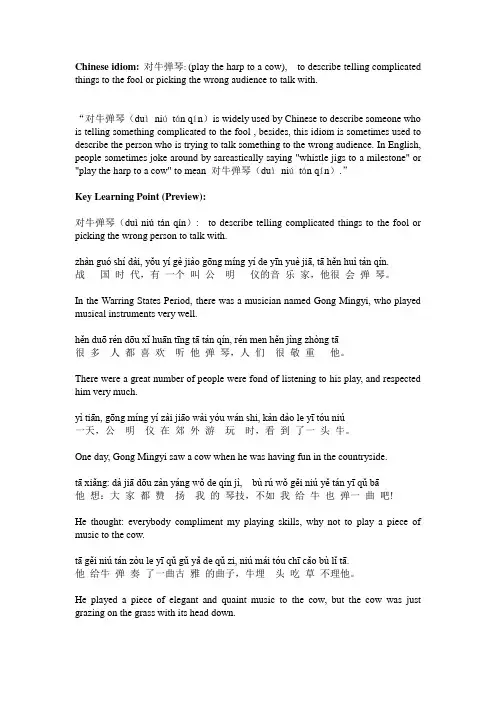
Chinese idiom:对牛弹琴: (play the harp to a cow), to describe telling complicated things to the fool or picking the wrong audience to talk with.“对牛弹琴(duìniútán qín)is widely used by Chinese to describe someone who is telling something complicated to the fool , besides, this idiom is sometimes used to describe the person who is trying to talk something to the wrong audience. In English, people sometimes joke around by sarcastically saying "whistle jigs to a milestone" or "play the harp to a cow" to mean 对牛弹琴(duìniútán qín).”Key Learning Point (Preview):对牛弹琴(duì niú tán qín):to describe telling complicated things to the fool or picking the wrong person to talk with.zhàn guó shí dài, yǒu yí gè jiào gōng míng yí de yīn yuè jiā, tā hěn huì tán qín.战国时代,有一个叫公明仪的音乐家,他很会弹琴。
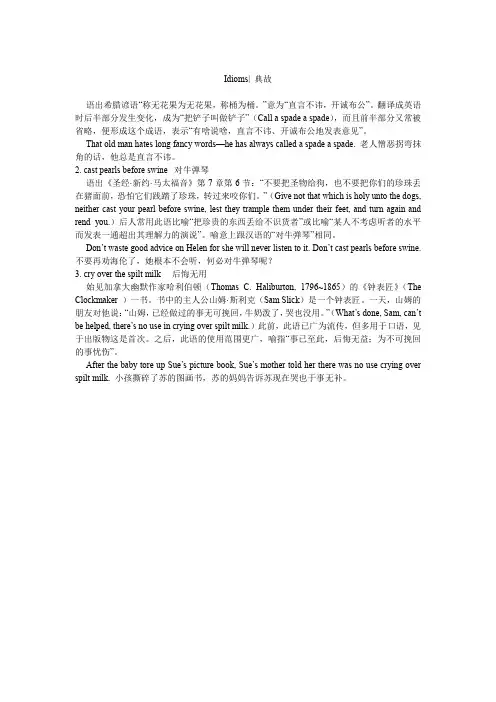
Idioms| 典故语出希腊谚语“称无花果为无花果,称桶为桶。
”意为“直言不讳,开诚布公”。
翻译成英语时后半部分发生变化,成为“把铲子叫做铲子”(Call a spade a spade),而且前半部分又常被省略,便形成这个成语,表示“有啥说啥,直言不讳、开诚布公地发表意见”。
That old man hates long fancy words—he has always called a spade a spade. 老人憎恶拐弯抹角的话,他总是直言不讳。
2. cast pearls before swine 对牛弹琴语出《圣经·新约·马太福音》第7章第6节:“不要把圣物给狗,也不要把你们的珍珠丢在猪面前,恐怕它们践踏了珍珠,转过来咬你们。
”(Give not that which is holy unto the dogs, neither cast your pearl before swine, lest they trample them under their feet, and turn again and rend you.)后人常用此语比喻“把珍贵的东西丢给不识货者”或比喻“某人不考虑听者的水平而发表一通超出其理解力的演说”。
喻意上跟汉语的“对牛弹琴”相同。
Don’t waste good advice on Helen for she will never listen to it. Don’t cast pearls before swine. 不要再劝海伦了,她根本不会听,何必对牛弹琴呢?3. cry over the spilt milk 后悔无用始见加拿大幽默作家哈利伯顿(Thomas C. Haliburton, 1796~1865)的《钟表匠》(The Clockmaker )一书。
书中的主人公山姆·斯利克(Sam Slick)是一个钟表匠。
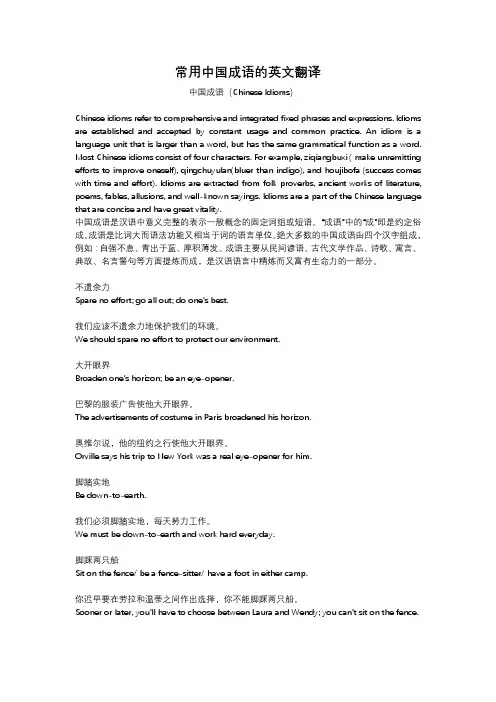
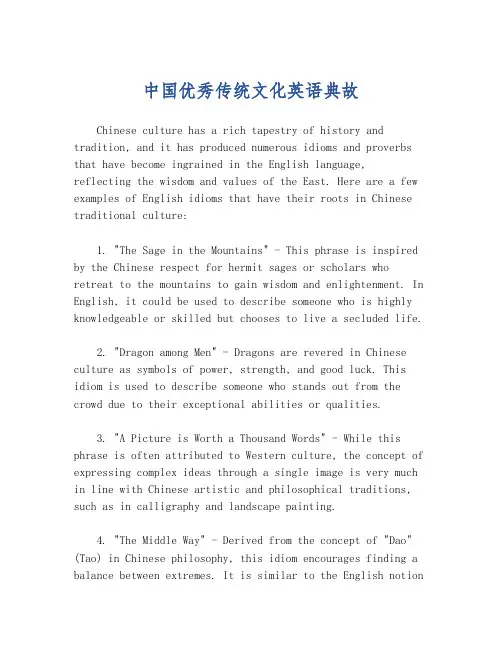
中国优秀传统文化英语典故Chinese culture has a rich tapestry of history and tradition, and it has produced numerous idioms and proverbs that have become ingrained in the English language,reflecting the wisdom and values of the East. Here are a few examples of English idioms that have their roots in Chinese traditional culture:1. "The Sage in the Mountains" - This phrase is inspired by the Chinese respect for hermit sages or scholars who retreat to the mountains to gain wisdom and enlightenment. In English, it could be used to describe someone who is highly knowledgeable or skilled but chooses to live a secluded life.2. "Dragon among Men" - Dragons are revered in Chinese culture as symbols of power, strength, and good luck. This idiom is used to describe someone who stands out from the crowd due to their exceptional abilities or qualities.3. "A Picture is Worth a Thousand Words" - While this phrase is often attributed to Western culture, the concept of expressing complex ideas through a single image is very much in line with Chinese artistic and philosophical traditions, such as in calligraphy and landscape painting.4. "The Middle Way" - Derived from the concept of "Dao" (Tao) in Chinese philosophy, this idiom encourages finding a balance between extremes. It is similar to the English notionof moderation and is often used to suggest a compromise or a balanced approach to a problem.5. "Red Envelope Good Fortune" - The tradition of giving red envelopes (hongbao) filled with money during Chinese New Year symbolizes the transfer of luck and prosperity. In English, this could be used to describe the act of giving a gift that brings good fortune.6. "The Bamboo and the Tree" - Bamboo is a symbol of resilience and flexibility in Chinese culture. This idiom, which compares the ability of bamboo to bend without breaking to the rigidity of a tree that might snap, is used to describe the value of adaptability in the face of adversity.7. "The Great Wall of China" - While not an idiom, the Great Wall is often used metaphorically in English to describe an immense or insurmountable challenge or barrier.8. "The Paper Tiger" - This phrase comes from the Chinese concept of a seemingly fierce but actually weak opponent. In English, it is used to describe someone or something that appears threatening but is actually harmless.9. "The Willow's Flexibility" - Willows are known for their ability to bend with the wind. This idiom, which is similar to "The Bamboo and the Tree," is used to describe someone who is able to adapt to changing circumstances with grace.10. "The Phoenix Rises" - The phoenix is a mythical birdin Chinese culture that symbolizes rebirth and renewal. This idiom is used to describe a situation where someone or something makes a remarkable recovery or comeback.These idioms and proverbs are a testament to theinfluence of Chinese culture on the global lexicon and serveas a bridge between Eastern philosophy and Western expression.。
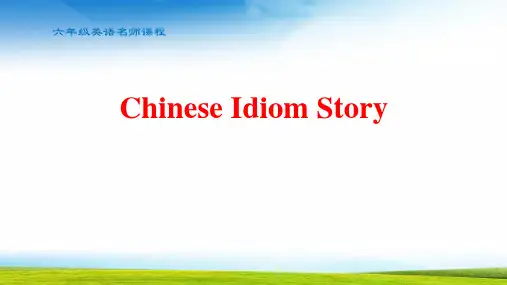
传统文化作文以及翻译英文英文:As a Chinese, I am proud of our traditional culture, which has a long history and rich heritage. Traditional culture includes various aspects such as language, customs, art, and philosophy. It is deeply rooted in the daily life of the Chinese people and has a profound influence on their way of thinking and behavior.For example, the Chinese language is an important carrier of traditional culture. It is not only a means of communication, but also a symbol of national identity. Many Chinese idioms and proverbs are derived from classical literature and have been passed down from generation to generation. These idioms and proverbs reflect the wisdom and philosophy of the Chinese people, and are still widely used in daily life.In addition, traditional Chinese customs and rituals,such as the Spring Festival, Qingming Festival, and Mid-Autumn Festival, are an integral part of traditional culture. These festivals are not only occasions for family reunions and gatherings, but also opportunities for people to express their respect for their ancestors and thenatural world. For example, during the Spring Festival, people will set off fireworks and hang red lanterns todrive away evil spirits and welcome the arrival of the new year.Furthermore, traditional Chinese art, such as calligraphy, painting, and opera, also embodies the essence of traditional culture. For instance, Chinese calligraphyis not only a form of artistic expression, but also a reflection of the Chinese people's pursuit of harmony and balance. The strokes and lines in calligraphy are imbued with profound meaning and convey the thoughts and emotions of the calligrapher.Overall, traditional culture plays a significant rolein shaping the values and beliefs of the Chinese people. It fosters a sense of belonging and identity, and provides aspiritual anchor in the fast-changing modern society.中文:作为一个中国人,我为我们的传统文化感到自豪,它有着悠久的历史和丰富的传承。
Chinese Idioms and Their StoriesThe general Chinese view of chengyu (literally “established speech” ) is that it expresses the essence of the language , adding to it beauty and color by virtue of its richness and originality.But the expression chengyu may not have an exact equivalent in other languages. What exactly is chengyu, how can it be defined? To this question most users of Chinese have no definite answer, nor are they keen to seek it , so long as its lack does not hinder their use of the language.Since we are dealing with the translation of Chinese into English , it is reasonable to look first at the English word idiom, which in almost all cases is expressed as chengyu in Chinese, just as chengyu is translated into English as idiom. Is there a difference between the two , or are they exactly equivalent and interchangeable in every case?According to several popular English dictionaries, the definitions for the word “idiom” are given as follows:Webster------1.a.the language proper or peculiar to a people or to a district, community or classb. the syntactical, grammatical or structural form peculiar to a language2. an expression established in the usage of a language that is peculiar to itself either in grammatical construction or in having ameaning that cannot be derived as a whole from the conjoined meanings of its elements3. a style or form of artistic, expression (as in painting, writing, composing ) that is characteristic especially of an individual, aperiod or movement, or a medium or instrumentOxford------1. language of a people or country2. specific character of this3. form of expression peculiar to a language or person, peculiarity of phraseology approved by usage though having meaning not deductible from those of the separate words4. characteristic mode of expression in music, art, etc.Chambers------1/ an expression with a meaning that connot be guessed from the meanings of the individual words2. the expressions of a language in general---the English idiom3. an individual style in music, etc.Longman------1. the language peculiar to a people , country, class , community or , more rarely, an individual2. the structure of the usual patterns of expression of a language3. a construction, expression etc. having a meaning different from the literal one or not according to the usual patterns of the language4. a writer’s characteristic use of words; a characteristic style in music , art , etc .The 1980 edition of Britannica Book of English Usage gives only one , namely,”An idiom is a phrase which is an established and correct part of a particular language but which makes little sense. If taken literally.:The 1979 edition of Longman Dictionary of Idioms states that : “An idiom is a fixed group of words with a special different meaning from the meanings of the separate words.””It is , therefore, clear that the word “idiom” in current usage chiefly refers to “ a set phrase”. This predominant feature in the English language, of course, can also be found in Chinese chengyu, but it forms only one of the latter’s many features. Its definition in Chinese is much more complicated. Some people say that it means shuyu(idiom,idiomatic phrase), suyu (common saying, folk adage) and yanyu(proverb, saying , adage, saw); others think that it should include yuyan( fable, allegory, parable), diangu(allusion, literary quotation) and still others claim that it includes xiyu(idiom), mingyan (well-known saying, celebrated dictum, famous remark),geyan( maxim, motto, aphorism), xiehouyu(the second part of a two-part allegorical saying that actually carries the message, though sometimes unstated), liyu(slang), fangyan (dialect) , etc. Some prople even assert that it should not exclude shuyu( technical terms ) and biaoyu and kouhao(slogan, poster, watchword).Furthermore, there is the question of national characteristics. Somethink that those expressions which originated from alien culture should not be considered Chinese chengyu.Those who are opposed to this view argue that such expressions have become so commonly used that they can be regarded as part of Chinese chengyu.In view of the complexities and controversies involved, it may be necessary to consult the three popular and authoritative lexicographical works so far available here :Cihai, Ciyuan and Xiandai Hanyu Cidian . Cihai counts chengyu as “ a kind of shuyu; set phreases or word groups that are of customary usage . The formation of chengyu is of great variety and the origins of various chengyu are also diversified. Some of them can be understood from the surface meanings of the words they are composed of ; others can be undersood only if their origins are known.” Ciyuan puts chengyu as “old sayings of common usage and those phrases or clauses which are set in form to express a complete idea.” Xiandai Hanyu Cidian defines chengyu as “set phrases or clauses that people have customarily used for ages in terse forms and with incisive meanings.”In comparing the definitions of the word “idiom”in English and chengyu in Chinede, we find that they are not exactly the same. The only element that is in common is that thaey are more or less established by usage and accepted through practice. The Chinese chengyu involves much more .It seems to bear more historical color, carries more literary allusions (including those from fables and legends ) and is rendered morethrough anaogy, whether metaphor or simile.This feature of Chinese chengyu, invites the ompilation of a book like this which can only be “idiom”. So for lack of a better word, this book is called One Hundred Chinese Idioms and Their Stories. And the guiding principle in choosing the chengyu that should go into the book is that they must have an interesting story behind them. Naturally, therefore, the readers will find that many commonly used chengyu are not included in this volume, simply because their source is not from a story. For the same reasom, popular quotations from famous essays or poems are often not included. It goes without saying this book connot be a comprehensive one ,being limited in its size.As to the source or origin of a Chinese chengyu, the compiler in most cases gives only that which has been recognized to be so. This is by no means to ignore recent findings that some chengyu can be traced back still further to an earlier source. For instance, “不可同日而语”used to be attributed to The Book of Han( 汉书-息火躬传),but now it has been found to have its source in the Warring States Records(战国策-赵策二).Though the expressions cheng yu are considered to be more or less set or established in form or structure, variations are not rare. Variants are sometimes seen with the mere change of one word or replacement by a synonym or a nomonym or even change of the word order.For instance, “尔虞我诈”can be written as “我诈尔虞”;“假道灭虢”,as “假途灭虢”.In this way sometimes the original meaning of the hengyu is partially changed .For instance, “别无长物”can be written as “一无长物”,which of course emphasizes the idea that the man has absolutely no personal possession at all.But there are cases in which the original meaning of the chengyu expression is entirely changed, so that the meaning is either extended or even contrary to the original one.For instance, “枯木朽珠”now has an extended meaning of “无庸之辈”(good-for-nothing persons); “朝三暮四” now has the meaning of a man who always changes his decision or inclination. “李代桃僵” is now only used to mean “substitution”, having lost the original idea of brotherly feelings. “陌路萧郎”refers now to a man who is inconstant in love; and “买椟还珠” used to be employed to satirise the seller of the pearl but now it is used to mock the buyer of the pearl who values superficial beauty more than actual worth . “尔虞我诈”is no longer used in the original sense of “ neither side cheating the other”, but in the entirely opposite sense of “mutual mistrust with both parties playing tricks”. In all such cases, the compiler has supplied a note to point out the changes. Such changes may include those from commendatory sense to derogatory sense, or vice versa. They have of course evolved through the ages.Another feature of Chinese chengyu is that from one source or origin or story more than one chengyu expression is often derived. That is tosay , different chengyu expressions can come from one and the same story. For instance, from the story of “Mao Sui Offers His Own Service”another chengyu expression “脱颖而出” was derived. And “两败俱伤”, “一举两得”, “坐山观虎斗”, and “坐观成败”all came from the same story.As has been said , if there is no story behind a chengyu , it is not to be included in this book. But sometimes , there is another story associated with it ;that other story is included in the foot notes.As to the topic of a cheng yu story , the compiler and translator has tried his best to retain the national flavor by following the principle : Translate literally, if possible, or ,appeal to free translation. In other words , if literal translation does not carry any meaning in English , nor can it maintain the national color, then resort to free translation, which of course is a sort of compromise. As Benjamin Jowett once said, “All translation is a compromise--- the effort to be literal and the effort to be idiomatic.” To seek equivalents where there are none is a waste of effort. Speaking of seeking equivalents, we also have to guard against one thing. As most translators know well, sometimes one may find an idiomatic expression in English which seems to be almost equivalent to the Chinese and therefore think it is the right one to use. The fact is that in doing so, very often the original meaning , colour and taste are more or less lost, that is, face-value equivalence may not be very successful. Instead, it maylead to misunderstanding or even distortion of the meaning of the original expression. For instance, “行尸走肉” may seem to be equal in sense to an idiomatic expression in English : “walking skeleton”, which, however, indicates a very thin man in that language; “锦上添花”may look like equal to the expression “ carry coals to New castle” in English, but that sentence actually means “take goods to a place where they are already plentiful”---an effort uncalled for; and “轻而易举”may be easily translated into “have something at one’s fingers’end”which, however,actually means “be thoroughly familiar with something”. In such case, they are rather to be translated more literally so as to be more “faithful” to be meaning of the Chinese chengyu. Of course, there are rare cases of basic equivalence like “百闻不如一见”(which can be translated into “seeing is believing”) and “旁观者清”(which can be translated into “the onlooker sees most of the game”).Before concluding, another point should be mentioned It is about the question of “ repetition”. In English, the repetition of a word , a phrase or an expression is generally not recommendable unless for rhetorical emphasis or forcefulness. But in Chinese, especially in classic Chinese, repetition is quite often employed, yet without giving the readers the feeling of redundancy or superfluity. So, in order to preserve the original style ,the translator tries as much as possible to retain repetitions and at the same time to keep to the plain succinct character of the Chineselanguage. To use too many variations or too much florid language at the expense of the beauty and simplicity of Chinese is not advisable.The foot notes are not translations from any ready Chinese versions; they are the translator’s own.。
2019年6月英语六级翻译真题答案及解析:成语成语( Chinese idioms)是汉语中的一种独特的表达方式,大多由四个汉字组成。
它们高度简练且形式固定,但通常能形象地表达深刻的含义。
成语大多来源于中国古代的文学作品,通常与某些神话、传奇或者历史事件相关。
假如不知道某个成语的出处,就很难理解其确切含义。
因此,学习成语有助于人们更好地理解中国传统文化。
成语在日常会话和文学创作中广泛使用。
恰当使用成语可以使一个人的语言更具表现力,交流更有效。
【译文】Chinese idioms are unique expressions in Chinese, mostly composed of four Chinese characters. Despite the extreme conciseness and fixed format, they usually convey/express profound meanings visually. These idioms, largely derivedfrom ancient Chinese literary works, are usually related to certain myths, legends or historical events. It will bedifficult to understand/grasp the exact meaning without knowing the source of an idiom. Therefore, learning idiomscan help people understand Chinese traditional culture better. Idioms are widely used in daily conversations and literary works. Proper use of idioms can make one’s language more expressive and communication more effective.1.成语( Chinese idioms)是汉语中的一种独特的表达方式,大多由四个汉字组成。
U n i t6A n c i e n t s t o r i e s(1)Date:_______name:_______【知识要点】★Keywords:1.ancientadj.古代的inancienttimes在古代ancientbuildings古代的建筑物【拓展】近义词:oldadj.老的,旧的;反义词:modernadj.现代的2.warn.战争,可数名词theFirstWorldWar第一次世界大战theSecondWorldWar第二次世界大战Thetwocountrieshavebeenatwarforfiveyears.这两个国家打了五年的战。
【拓展】反义词:peacen.和平Peopleareagainstthewarandforthepeace.人们反对战争,支持和平。
3.understandv.懂,理解注意:understand的过去式和过去分词都是understood. Idon’twhattheteachersaid.我不理解老师说的话。
4.differencen.差别;不同<可数>differentadj.不同的;有差别的differv.区分Canyoufindoutthedifferencesbetweenthetwopictures常用搭配:bedifferentfrom与...不同反义词:similarityn.相像处;相似点similaradj.相似的besimilarto与...相似5.*Greekn.希腊人Greekn.希腊语Greecen.希腊AncientGreekswereoftengreatthinkers.古希腊人是伟大的思想家6.soldiern.士兵Somepeoplethinktheylooklikesoldiers,andothersthinktheylooklikeanimals.有人认为它们看起来像士兵,有的人认为它们像动物。
On Idioms and Their Translation from Chinese into English习语及习语的汉英翻译AbstractIdioms are just like incomparably resplendent bight pearls emitting dazzling rays in the palace of literature. Throughout the ages, they animate the works of countless men of literature and writing. Idioms have fixed patterns and abundant connotations. Their vivid images explicitly convey incisive meanings. Chinese idioms are part of the essence of Chinese culture with a history of thousands of years. In this thesis, the English translation of Chinese idioms will be discussed on the foundation of simply introducing the definitions, origins, features, and classifications of idioms, and a series of principles and methods of idiom translation will be put forward, mainly involving the translation of the Chinese idioms which have similar and dissimilar implications in English.Key wordsChinese idioms;similarity;dissimilarity摘要习语犹如文学殿堂里一颗璀璨无比的明珠放射着历久不衰的光芒,古往今来,无数文人墨客的笔下都闪耀着它的异彩。
Old Chinese Idioms:历史典故的英文翻译一桶水摇不响,半桶水响叮当有人照字面译成:The full pot of water makes no sound; the half-empty pot of water is noisy. 老外听后,也许会感到困惑。
他们有自己的说法:A little knowledge (or learning) can be (or is) dangerous.(一知半解很危险。
)或者说:Still water runs deep.(静水深不可测。
)也可以说:He who knows the most says the least.(懂得越多的人,反而说得越少。
)至于"大智若愚",通常可以这么说:A truly wise person does not show off his (her) ability.(真正聪明的人,是不会显要自己的能力)水落石出有人照字直译为:As the water level sinks,the stones are exposed.这样说,恐怕老外还是听不懂。
他们的说法是:All secrets may eventually come to light.(所有祕密最后总会曝光。
)也可以说:Eventually, every secret will be disclosed.这山望到那山高有人译成:The apples on the other side of the wall are the sweetest.(意思是:墙那边的苹果最甜。
)当然,如要译成:If you stand on a mountain, you feel the distant mountain seems higher than yours. 老外也勉强能接受。
而他们的最习惯说法是:The grass always looks greener on the other side.(另一边的草,看来总是绿些。
)烈火炼真金,患难见真情有人译成:Fire is the test of gold;adversity is the test of friendship. 这句译文,虽然很好,老外也能了解,但是他们还有另外的说法:Liquor brings out a person's true color.(烈酒能显示一个人真正的特色。
)或者说:Wine reveals a person's true heart.虽然老外不用"烈火炼真金"的比喻,但有"路遥知马力"的说法:By a long road, we know a horse's strength; at times of difficulty, we discover a friend's true character.雷声大,雨点小有人译为:The thunder roars loudly, but little rain falls. 或者说:All we hear is thunder, but no rain falls. 虽然这样直译比较容易理解,但是老外的说法是这样的:Actions speak louder than words. (行动胜于言谈。
)或All we hear is words, but there is no action. (只动嘴不动手。
)或Actions and words should go hand in hand. (言行必须一致。
)另外,还有英语里还有这样的说法:An empty barrel makes biggest sound.(空洞的话说得太多了。
)人不可貌相,海水不可斗量有人译为:A man can not be known by his look, nor can the ocean be measured by a dipper. 这样的译法只是直译,如果能够稍加修改,老外就能了解:A man can not be judged by his appearance, nor can the water in the sea be measured by a bucket. 不过,老外通常的说法是这样的:We can not judge a person by appearance only. 或You can not judge a book by its cover.(意思是:一本书的好坏取决于它的内容,而不是它的封面装帧的漂亮与否。
)口蜜腹剑,笑里藏刀有人译为His mouth is honey; his heart is a sword. 外国人听了会对这样的比喻摸不着头脑,如果要形容某人"口蜜腹剑,笑里藏刀",我们可以说with honey on one's lip and murder in one's heart, 或者honey-mouthed but dagger-hearted.也可以更直接的译成He is an evil man who has a mouth that praises and a hand that kills.少壮不努力,老大徒伤悲有人译成If you neglect study when you are young, what may happen to your old age? 这句问句会把老外问得云里雾里,因为他们沒有"学而优则仕"的思想,也不认为功课差,将来就会伤悲。
他们劝告子女经常说的是Studying / working hard can lead you to a brighter / more promising future.(努力用功会带给你光明的前程。
)当然也可以对年轻人说:Study hard when you are young. It will pay off when you get older.(年轻时好好努力,到老的时就会觉得学有所值。
)学如行舟,不进则退如果直译成:Learning is like rowing upstream; not to advance is to drop back. 老外听后,也许会感到一头雾水。
这样修改一下,表达可以清晰一些:Learning seems like rowing upstream(逆流); if one does not advance, one will fall back.Learning is like rowing against the current(激流), if one does not advance, one will retreat. 更直接的说法是:If you don't make progress, you will fall behind.一日为师,终身为父有这样的译法:He who teaches me for one day is my father for life. If you are my teacher for even one day, you will be my teacher (mentor) all my life. He who teaches me may be considered my father-figure for life. 这几种译法意思都是"老师即使对我只有一天的教诲,也会让我一生都受用不尽"。
外国人也有他们表达师生关系的谚语,如:Teach others to fish and they will fish for a lifetime.(授人以鱼,不如授人以渔。
)Give a man fish, he will have a meal; teach him to fish, he will have food all his life.忠言逆耳,良药苦口有人译成:Faithful words are contrary to the ears; good medicine tastes bitter to the mouth. 也有人反译为:Bitter words are medicine; sweet words bring illness.Good advice often jars on the ears; bitter pills have good effects. 这些说法,老外也会"一知半解", 不如直接一点说成:Honest advice may be distasteful to the recipient. Honest advice is hard to accept. Truth is a hard pill to swallow. 更简单的说就是:Truth hurts.近墨者黑,近朱者赤人直译为:one who stays near vermilion gets stained red, and one who stays near ink gets stained black(vermilion 是朱砂或鲜红色的意思。
)也有人译成:When you touch black, you become black; when you touch red, you become red. 这种说法,恐怕老外一时无法理解真正含意。
不过他们倒有这么说:One takes the behavior of one's company.(一个人的行为,往往受到朋友的影响。
)或One takes on the attributes of one's associates.(attributes 复数時是指品质、特性;associates 指朋友、同事)简单的说,就是:Watch the company you keep!(小心交朋友!)或者也可以说成:As he who lies with dogs will ridewith fleas, how could your son learn anything good by mixing with those people? (你儿子跟那些人混在一起,能学出个好来?)。